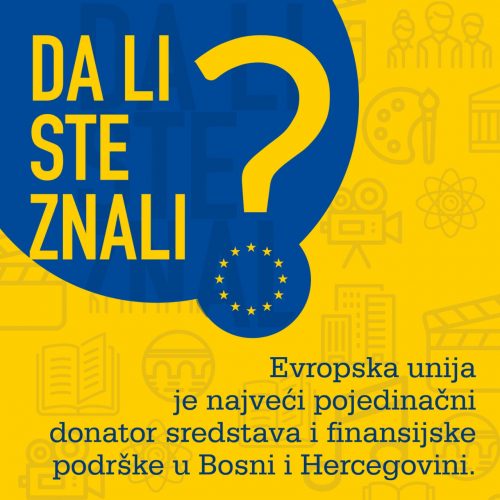The European Union is the single largest provider of funds and financial assistance to Bosnia and Herzegovina. The EU uses a variety of financial instruments, including centralized EU programmes. The aim of these EU programmes is to provide support to the policies of the European Union, improving cooperation between EU member states and their citizens in different areas: culture, science, environmental protection, entrepreneurship, consumer policies, education, health, the judiciary, and fiscal and customs policies, etc.

The conclusions of the Thesalloniki Summit of June 2003 enabled the participation of the countries of the Western Balkans in EU programmes, with the aim of supporting their efforts on their European paths, enabling exchange of good practices, experiences and knowledge, and ensuring adoption and implementation of the acquis. The participation of the countries of the Western Balkans in EU programmes is regulated by framework agreements on the participation of individual countries.
From January 2007, Bosnia and Herzegovina has been eligible to participate in EU programmes, based on the Framework Agreement between the European Community and Bosnia and Herzegovina in Community programmes. Bosnia and Herzegovina continues to expand its participation in EU programmes, based on institutional, human and financial capacities and needs.
EU programmes support the policies of the European Union and aim to improve cooperation in the fields of: culture, science, education, civil society, environmental protection, entrepreneurship, health, the judiciary, tax and customs policies, and others.
Horizon 2020 is the largest EU Research and Innovation programme ever, with nearly EUR 80 billion of funding available in the period 2014 – 2020 – in addition to the private investment that this funding will attract. It promises more breakthroughs, discoveries and world-firsts by taking great ideas from the lab to the market.
For more information: https://ec.europa.eu/programmes/horizon2020/en/what-horizon-2020
Erasmus+ is the EU programme supporting education, training, youth and sport. Its budget of EUR 14.7 billion will provide opportunities to over 4 million Europeans to study, train, gain experience, and volunteer abroad.
For more information: http://ec.europa.eu/programmes/erasmus-plus/node_en
European Cooperation in Science and Technology (COST) provides funding for the creation of research networks, called COST Actions. These networks offer an open space for collaboration among scientists across Europe (and beyond) and thereby give impetus to research advancement and innovation.
For more information: https://www.cost.eu/
COSME is a new programme launched by the European Commission to encourage the competitiveness of enterprises and small and medium-sized enterprises. The programme has a budget of EUR 2.3 billion for the period 2014 – 2020.
For more information: https://ec.europa.eu/growth/smes/cosme_en
The Creative Europe programme aims to support the European audio-visual, cultural and creative sectors. Different funding schemes encourage audio-visual, cultural and creative actors to operate across Europe, to reach new audiences and to develop their skills.
For more information: https://ec.europa.eu/programmes/creative-europe/node_en
EUROPE FOR CITIZENS The aim of the Europe for Citizens Programme is to contribute to citizens’ understanding of the EU, its history and diversity, and foster European citizenship and improve conditions for civic and democratic participation at the EU level.
For more information: https://eacea.ec.europa.eu/europe-for-citizens_en
EUREKA is a publicly-funded, intergovernmental network, involving over 40 countries. The aim is to enhance European competitiveness by fostering innovation-driven entrepreneurship in Europe, between small and large industry, research institutes and universities.
For more information: http://www.eurekanetwork.org/
Customs 2020 is an EU cooperation programme that provides national customs administrations with the opportunity to create and exchange information and expertise. It allows joint development and operation of major trans-European IT systems and establishment of networks by bringing together national officials from across Europe. Customs 2020 has a budget of EUR 547.3 million. The current programme covers the period 2014-2020.
For more information: https://ec.europa.eu/taxation_customs/business/customs-cooperation-programmes/customs-2020-programme_en
Fiscalis 2020 is an EU cooperation programme that enables national tax administrations to create and exchange information and expertise. It enables joint development and operation of major trans-European IT systems, as well as establishing networks by bringing together national officials from across Europe. The current programme covers the period 2014-2020 and has a budget of EUR 234.3 million.
For more information: https://ec.europa.eu/taxation_customs/fiscalis-programme_en
The EU’s new Health Programme, Health for Growth, aims to build on the achievements of the previous EU Health Programme and better enable health to contribute to economic growth and the Europe 2020 objectives. It has an increased budget of EUR 449.4 million over a seven year period.
For more information: https://ec.europa.eu/health/funding/programme_en
The Consumer Programme 2014-2020 is a funding programme of the European Commission created to support growth and competitiveness within the Union. The general objective of the programme is to ensure a high level of consumer protection through the empowerment of European consumers. Consumers are placed at the heart of the internal market, in the frame of the EU strategy for smart, sustainable and inclusive growth.
For more information: http://ec.europa.eu/chafea/consumers/index_en.htm
